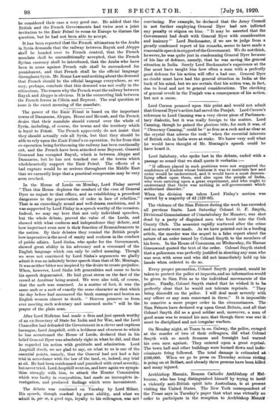In the House of Lords on Monday, Lord Finlay moved
"That this House deplores the oonduct of the case of General Dyer as unjust to that officer, and as establishing a precedent dangerous to the preservation of order in face of rebellion." That is an exceedingly sound and well-drawn resolution, and it was supported by Lord Finlay in a speech worthy of the occasion. Indeed, we may say here that not only individual speeches, but the whole debate, proved the • value of the Lords, and showed with what coolness and independence they debate, and how important even now is their function of Remembrancers to the nation. By their debates they remind the British people how imperative is the need of sanity and coolness in the conduct of public affairs. Lord Sinha, who spoke for the Government, showed great ability in his advocacy and a command of the English language which can only be called amazing. Though we were not convinced by Lord Sinha's arguments we gladly admit it was an infinitely better speech than that of Mr. Montagu. It was neither bitter nor inspired by the desire to create prejudice. When, however, Lord Sinha left generalities and came to facts his speech degenerated. He laid great stress on the fact of the crowd at Amritsar being seated. We were also told, of course, that the mob was unarmed. As a matter of fact, it was the same mob or a mob of exactly the same character as that which the day before had massacred the bank managers and beaten an English woman almost to • death. "Heaven preserve us from ever meeting such sedentary and unarmed mobs" will be the prayer of the plain man.


































 Previous page
Previous page